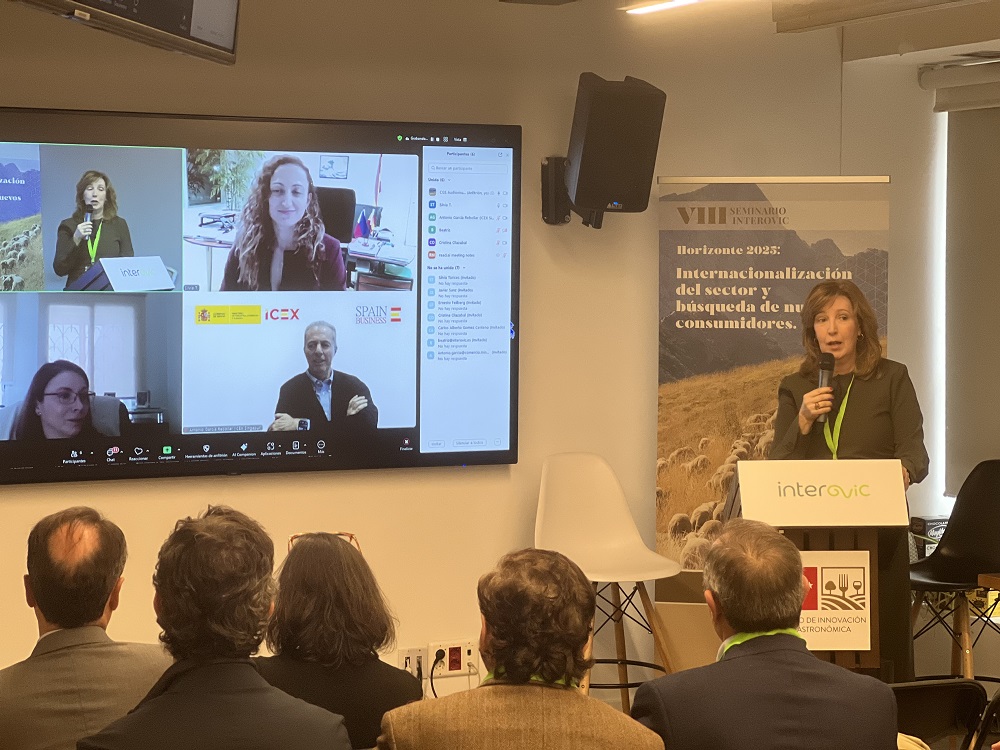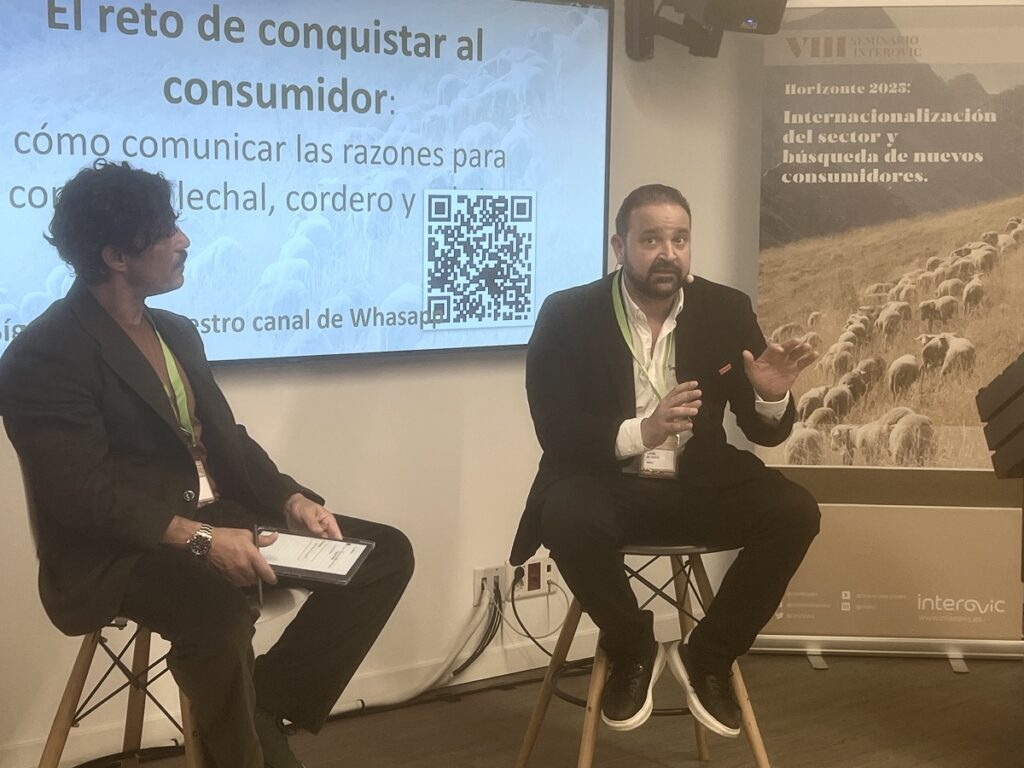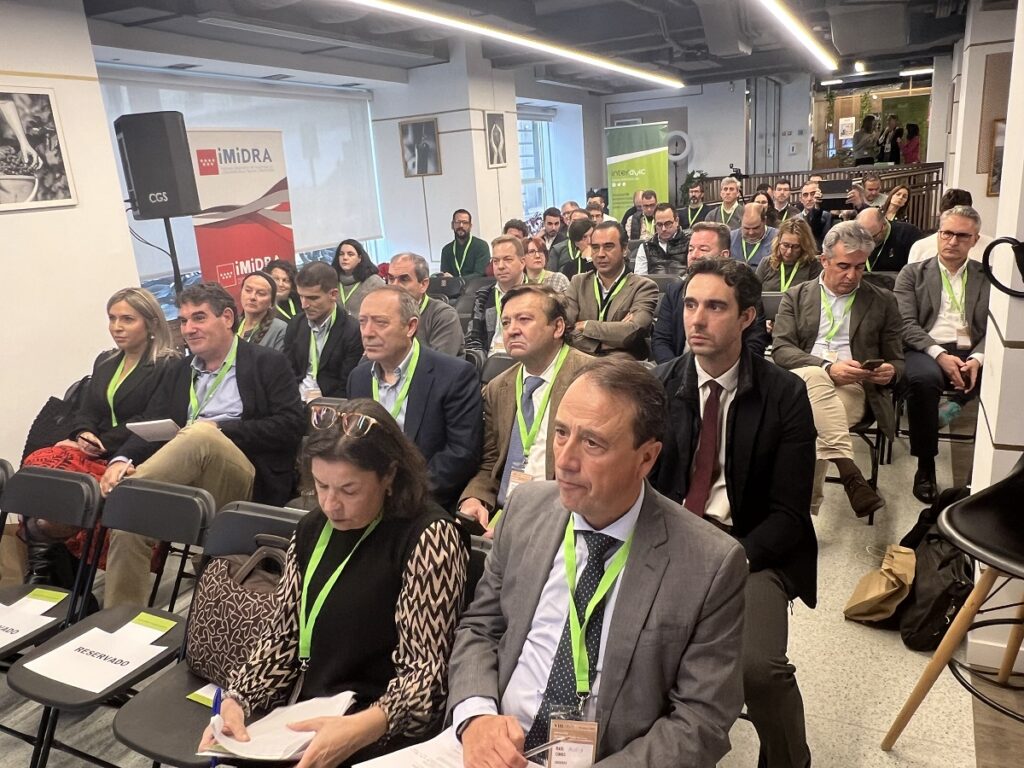INTEROVIC has held its VIII Internationalisation Seminar under the motto “Horizon 2025. Internationalisation of the sector and search for new consumers”. The event, which brought together around a hundred professionals, mainly producers and marketers, took place at the IMIDRA Gastronomic Innovation Centre in Madrid, and was attended by ICEX and economic advisers from the Spanish embassies of strategic countries for national sheep and goat products.
During the day, key issues were addressed such as internationalisation, challenges and opportunities in strategic markets, the impact of the EU-Mercosur Agreement and communication strategies for the sector. Currently, one in five lambs raised in Spain are exported, consolidating the sector as a benchmark for quality and sustainability in the global market.

Emerging markets: key opportunities for export
In the first round table, Lidia Escribano García, head of the Food and Beverage department at ICEX, highlighted the lines of collaboration with INTEROVIC at an international level and moderated the heads of the ICEX offices in the Philippines, Singapore, Algeria and Morocco.
Philippines: Silvia Torices, economic and commercial advisor at ICEX in the Philippines, highlighted the trend of an increase in the purchasing power of an ascending middle class, the largest in Southeast Asia and, therefore, the opportunity to absorb Spanish production, supported by the positive image of the Spanish agri-food sector. Another favourable factor is the future of the EU-Philippines Free Trade Agreement, currently in an advanced negotiation process.
Singapore: Antonio García Rebollar highlighted that this country, with the highest GDP per capita in Southeast Asia, offers great possibilities for Spanish meat, especially with Halal and organic certifications.
Algeria: Cristina Eugenia Olazábal stressed that, due to population and food use, lamb meat has a very favourable projection in Algeria, and especially that which comes from Spain, proven by its high quality and competitive prices. The authorities of this country are interested in promoting the development of sheep and goat meat production in the medium term.
Morocco: Javier Sanz pointed to the seasonality of the market and the advantageous access of Spanish livestock farmers, highlighting zero tariff quotas for live animals.
Regarding the United States and Canada, Diego Uriel, Specialist in International Business and Geopolitical Analysis, United States and Canada, analysed the potential of these markets due to their low self-sufficiency in sheep and goat meat and their demographic diversity, despite geopolitical uncertainties.
“Regarding geopolitical risks, the use of tariffs by the US authorities is seen more as a tool of punishment and negotiation to reduce the US trade deficit than as a protectionist manoeuvre. In addition, there is a lot of uncertainty about the possible geopolitical scenarios, but there is sufficient confidence in economic stability in the medium term. However, European companies may experience market shock in the short term, so they must minimise their exposure and dependence,” he said.
How to communicate with the consumer: transparency, passion and proximity
These are three drivers that were emphasised in the next session of the seminar to reconnect with society and effectively convey the reasons for consuming suckling lamb, lamb and goat.
“New digital formats, social networks and the growing sensitivity towards sustainability require adapting messages and arguments to a more informed and demanding audience,” said Miguel Chico, a communicator, who has encouraged the revival of the story as sector activists and has appealed to the responsibility as members of the sector for that defense of the role of the livestock farmer in the rural world: “feeding the world.”
But scientific evidence also represents a unique opportunity for the sector to lead the transformation of its public image. Meanwhile, Ramón De Cangas, dietician-Nutritionist and doctor in Food Science, has recalled that “in the food matrix, meat is key: other very beneficial substances in this food are forgotten, beyond the necessary minerals, proteins and vitamins that it contains. I frequently see in the clinic that some consumers move away from a healthy pattern such as the Mediterranean diet by eliminating meat.”

Keys to understanding the impact of Mercosur
The presentation by Horacio González-Alemán, strategic consultant in international agri-food economics, has analysed in depth the current situation of the EU-Mercosur Association Agreement
and has broken down its possible implications for the production and marketing of suckling lamb, lamb and goat, such as the new tariffs, health requirements and quality standards, as well as the impact on the competitiveness of the Spanish sector against the large South American producers.
“Europe needs more partners and must leave the bipolar system United States-China. The EU-Mercosur agreement means more markets, but more competition. In the short term they win, in the long term we do. It can be a great opportunity for production with seals of origin and, in addition, animal feed can become cheaper (soy and corn), which will benefit livestock. There is no risk that France and Poland can create a blocking minority for its implementation, but we must be vigilant to improve their environmental and social standards,” he explained.
Celebrate with Lamb! A campaign to rejuvenate consumption
Beatriz Casares, communications director of INTEROVIC, presented the new promotional campaign “Celebrate with Lamb!”, financed with European funds and designed to boost the consumption of suckling lamb, lamb and goat in Spain. The strategy includes:
At home: through collaboration with chefs, the proposal of innovative recipes, ready-made dishes and delivery.
Outside the home: collaboration with large gastronomic groups and participation in events such as music festivals.
This initiative seeks to rejuvenate the consumer profile and highlight the versatility and responsible origin of these meats.
Closing of the event
Raúl Muñiz, president of INTEROVIC, closed the seminar by highlighting the importance of unity and collaboration within the sector. He stressed that sustainability and quality will continue to be the fundamental pillars to consolidate the leadership of Spanish sheep and goat meat in international markets.

















